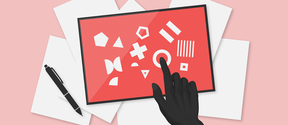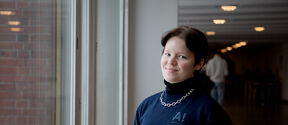Knowledge is power – visualized knowledge is superpower

“I used to think that top environmental problems were biodiversity loss, ecosystem collapse and climate change. I thought that thirty years of good science could address these problems. I was wrong. The top environmental problems are selfishness, greed and apathy, and to deal with these we need a cultural and spiritual transformation. And we scientists don’t know how to do that”, said Gus Speth, a US advisor on climate change.
The seminar on a theme Design. Reveal. Act. raised a clear thought: We need to change our behavior and thinking. In order to do that we need meaningful ways to communicate the data. Increased understanding can lead to transparency and better decision-making, and visualized data is therefore very powerful.
PhD candidate Ángeles Briones from Politecnico Milano reminded that information is not always objective, and thus there are no neutral visualizations; there is always agenda behind visualizations. That is why we need to tell how and why we have made the decisions on what to visualize. Briones also compared visualization to citizen activism and journalism; it is possible to make the invisible visible by spotting correlations and hidden interests.
Create empathetic narratives by data
Pau García, a researcher and designer, emphasized that information design is essential in how people perceive reality. At the moment, most people feel lack of empathy because on the web, everything is on the same level in information hierarchy: cat videos, news, opinions, entertainment, and fake news.
According to García, lack of action happens without inability to empathize. Rational facts and emotional awareness and human scale should be closer together. Pau García quoted Josef Stalin’s brutal words: “One death is a tragedy; a million deaths are just statistics.”
García also told an example from Auschwitz memorial site. When you visit it and see the room filled with cut human hair, even school kids become very silent. You don’t need to remember the statistics and historic facts. You understand and empathize, and deeply feel the scale of terror.
Meaningful narratives require multidisciplinary teamwork
Powerful information design is a combination of data, science and design; it is a medium for telling stories. The problem today is that we have too much data. Visualization helps us to think more clearly and understand the scopes of things. Rebecca Conroy and Duncan Swain from Beyond Words Studio explained that making meaningful visual narratives is hard team work.
“The audience and our clients seldom understand that several people, such as researchers, copywriters, concept designers, visual designers, animators and even sound designers have worked several days with data to crystallize information and create a meaningful narrative. Then it takes a few seconds to get people engaged to watch it for a minute or two.”
Good animations are not easy and fast to create, they take time. But they can accelerate how we understand things. They are means to get attention, and even inspire audience to take action. Conroy and Swain were both excited about the potential of information design. “We don’t know yet how far it can be stretched, but its boundaries can still be pushed. Information design process is highly innovative; it requires human brain and imagination.”
"The best seminar so far"
Rupesh Vyas, Professor of Practice of Visual Communication Design at Aalto University has lead the Information Design major at the Department of Media for two years now. Vyas was very satisfied with the seminar from the professional point of view: "The special thing about this conference was the diversity of and the experimental nature of many of the presentations. A lot of the speakers talked about the processes and ways of working, which was extremely valuable for participants."
Adina Renner, student research assistant and the main organizer of the conference was also excited. "It was a lot of work and a lot of fun to organize the conference. At Aalto, everything is possible. The threshold for doing things is very low. You can walk into the FabLab and there is someone to help you. You can even decide to organize an international conference like Visualizing Knowledge."
In general, feedback has been extremely positive. "According to several of our international speakers, this event was the best organized event they had ever attended. That is remarkable because it was organized almost entirely by Aalto students." said Minna Ainoa, the conference producer at Aalto University's Department of Media.
The 7th annual seminar on Visualizing Knowledge is the biggest event of its field in Finland, organized mainly by Aalto University’s Information Design and New Media students. The event gathered 400 participants to the Aalto University Otaniemi campus. Keynote speakers included representatives from Google Creative Labs, Beyond the Words Studio, Politechnico di Milano and Potsdam University for Applied Sciences and presented visualized cases from BBC, Google Creative Labs, Unicef, United Nations, Nike, and Bill & Melinda Gates foundation.
Read more news
Online Writing retreats for doctoral students in Finnish in spring 2026
Join the monthly communal meetings for research reporting.
Training available in AI, research data management, research ethics + more – register now!
New topics included! Registrations for spring 2026 are open.
Loan laptops available for students from IT Services for short-term use
Teachers can order laptops for students if needed.






